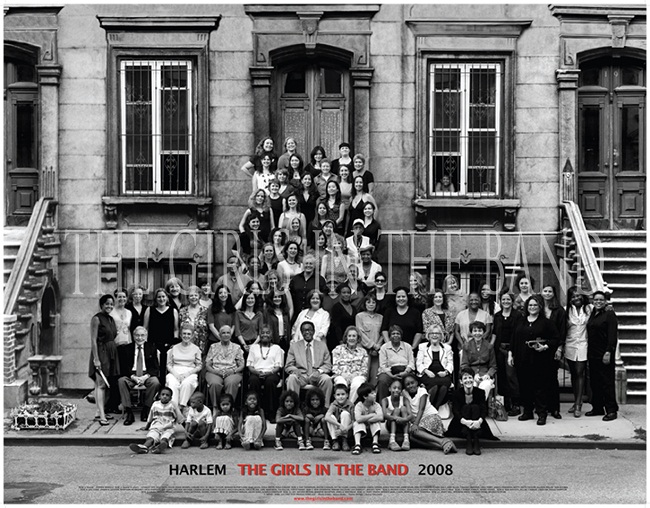
The Girls in the Band opens for a one-week run in NYC on May 10. Tickets here.
Women and Hollywood: What drew you to making this film?
Judy Chaikin: I come from a family of musicians and had been around big bands all my life and never saw a woman do anything in a big band except be a singer. In fact I had played trumpet in junior high, but gave it up because of the harassment I got from the boys in the band. So a few years ago when a friend told me that she had met a 90-year-old woman who had been a big band drummer, it didn’t believe it, but it made me curious to see if there were other women who had done the same…and of course there were.
WaH: How did you discover the stories of the female musicians?
JC: I started by asking my husband, who was a big band trumpet player, if he had ever heard of any women jazz musicians. After we got past the obvious few piano players, he mentioned Clora Bryant, who had played trumpet on a gig with him with the Gerald Wilson Big Band, and Peggy Gilbert who had been a sax player but then worked for the Musicians Union. After that, one person led me to the next.
WaH: What was the biggest challenge in making the film?
JC: Finding any kind of footage on the women. We really had to dig deep. Much of it was found in Europe where there was more acceptance of jazz and of women musicians.
WaH: What surprised you the most about the process?
JC: Just how many women there were who had played professionally and how high the quality of their work was.
WaH: Your previous film was on the legacy of the blacklist. Do you see these two stories having any themes in common?
JC: The themes that interest me the most are those that have to do with “righting a wrong.” That certainly was what “Legacy of the Hollywood Blacklist” was about, and that’s certainly what this film is about.
WaH: You studied at the AFI’s Directing Workshop for Women. What did the program teach you?
JC: How to think and work independently. They give you the tools and the opportunity to make a film then kick you out of the nest and say “Go Fly” It was the best training I could have gotten because it really showed you how self-reliant you have to be in the film industry.
WaH: What do you want people to come out of the film thinking about?
JC: People come out of the film absolutely amazed that they never had heard anything about any of these women. We’re constantly asked, where can I find their music? Sadly, a lot of it is not available. We hope to change that when we release a soundtrack from the film. What can these women teach us? How important it is to pursue your passion whether it means you’ll be recognized or not.
WaH: Do you think this is a feminist story?
JC: Yes, but more so I think it’s a humanist story and that’s what interests me the most.
WaH: How many years did it take to get this made?
JC: Eight Years!!!
WaH: What advice can you offer to other women directors, especially documentary directors?
JC: It may sound corny or hackneyed, but it can’t be said too often…never give up or stop dreaming. You may have to do a lot of less meaningful work along the way to sustain yourself, but you have to hold on to your dreams. That’s all we have. As Langston Hughes said, “Hold fast to dreams, for when dreams die, life is a broken winged bird that cannot fly.” It’s hard to keep hold of what you feel you were born to do, but there’s no way to avoid it coming back to haunt you. So you might as well just hunker down and go for it.
I have a note pasted to my computer that says, “if anybody says “No” to you and you’re discouraged for one second, you’re dead.” And for me those are words to live by. It’s a hard business and there can’t be any room for negativity or discouragement. So when you’re feeling sorry for yourself for having been born a woman in a man’s world, take the advice of Cher, in Moonstruck and “SNAP OUT OF IT!”
WaH: There seems to be more documentary directors than narrative directors. Why do you think that is? And why were you drawn to the documentary world.
JC: I trust you mean more “female” documentary directors…that’s because many of us who have not cracked the narrative world in a way that is satisfying, have had to find ways to work around it. In the documentary world you are free to pursue your vision in an arena that is under your control. For a woman it’s especially satisfying because we get to tell the stories that male executives are generally not interested in telling. There’s such an imbalance in the world of female and male energy and so many things that are wrong in the world can be laid at that doorstep, that I feel it’s incumbent on women to start holding up our end of the world. We have to stop looking to men to make it right. It’s our job, not theirs. Once we take that responsibility we can start to change hearts and minds. The documentary format gives you a means to do that.






